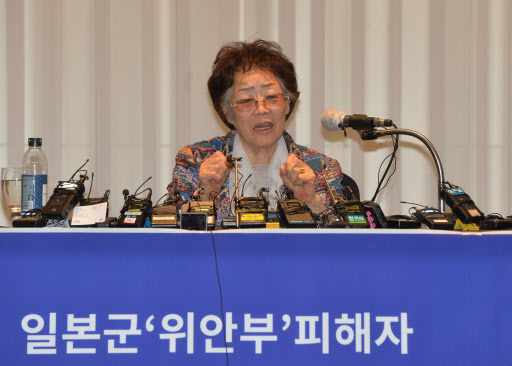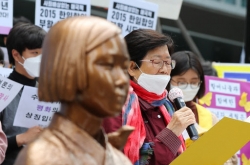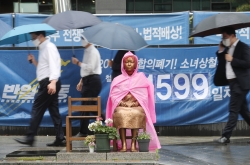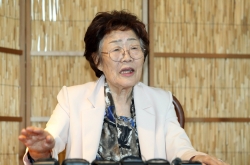A surviving victim of Japan’s wartime sexual slavery on Monday slammed a longstanding advocacy group for selling out the victims to raise donations in its 30-year campaign for the victims.
Lee Yong-soo, 92, also called for due punishment of the group -- Korean Council for Justice and Remembrance for the Issues of Military Sexual Slavery by Japan -- and its former President Yoon Mi-hyang over their alleged mishandling of donations.
“I was tricked and used. We did the work and only a handful of people took the money,” she said at a press conference held at a hotel in Daegu. “I am saying we should change the way we do protests (against the Japanese government), not saying we should end this.”
Lee spoke about her experience of being taken to churches, basketball matches and other places to collect donations with Yoon, who then worked for the civic group, since 1992, without knowing what the fundraising was for.
Lee also criticized the nongovernmental organization’s failure to distinguish victims of Japan’s wartime sexual slavery from Koreans forced into labor during Japan’s colonization of Korea. The organization’s campaign to seek justice for both sides, which she said is different in nature, led to a failure in resolving the comfort women issue, she said.
While saying she is still on the same page with the group in demanding an apology and compensation from the Japanese government, Lee stressed the importance of human exchanges between Korea and Japan, particularly students, to learn about their shared history.
“It is our students who can resolve the issue of comfort women, who were unfairly framed, through righteous history education, as they are the owners of the history,” she said. Comfort women is a euphemism for Korean victims forced into prostitution at frontline brothels for Japanese troops before and during World War II.
About “unthinkable things” that have emerged against the NGO, Lee said: “I think that’s something for prosecutors to handle.”
The press conference came amid snowballing allegations surrounding the entity, which has led the comfort women movement as well as the weekly rally every Wednesday near the Japanese Embassy demanding an apology from Japan.
It followed the first press conference she held on May 7, when she first raised allegations against the NGO and Yoon.
After Lee’s revelation, a series of other allegations followed suit, with a lack of transparency in collecting and using donations from the public meant to support the victims at the core. Among the serious allegations are the civic group’s dubious purchase and running of a shelter for former sex slaves in Anseong, Gyeonggi Province, as well as the collection of donations through Yoon’s personal bank accounts.
The NGO admitted to minor errors in its accounting practices, but denied any irregularities in the process of raising and using donations.
As part of the investigation, the prosecution raided the office of the civic group, a museum and shelter run by the organization last week after several complaints were filed.
Yoon denied all the allegations and did not appear in Monday’s press conference.
The relationship of Yoon with the victim -- who have been working together for nearly 30 years to raise awareness of the “comfort women” issue on the international forum -- appears to have fallen apart after Yoon left the NGO in March to run for a parliamentary seat. She was elected as a proportional representative from the ruling Democratic Party in the April general election.
Lee accused Yoon of leaving the civic group without resolving the comfort women issue.
“She ran for a proportional representative seat to serve her own interests,” Lee said at the press conference.
Yoon personally met with the victim at a hotel in Daegu last week to ask for her forgiveness.
Lee, however, made it clear on Monday she has not forgiven Yoon.
The ruling Democratic Party reserved its position on the allegations surrounding Yoon, saying it will watch the developments of the prosecution’s investigation.
Her revelation opened the floodgates for other allegations surrounding NGOs advocating for the victims, dealing a blow to the 30-year campaign to demand an apology and compensation from the Japanese government for its wartime atrocities.
The House of Sharing, which runs a nursing home where five of the survivors currently live, also faces allegations of misusing donations, its seven staff members revealed last week.
The whistleblowers accused the group, which is run under the Jogye Order of Korean Buddhism, of not spending the donations on the surviving victims and failing to provide them proper care and medical treatment.
The group denied the allegations.
(
laeticia.ock@heraldcorp.com)



![[From the scene] Activists strive to save legacy of ‘comfort women’ rally](http://res.heraldm.com/phpwas/restmb_idxmake.php?idx=605&simg=/content/image/2020/05/13/20200513000720_0.jpg)








![[Today’s K-pop] Blackpink’s Jennie, Lisa invited to Coachella as solo acts](http://res.heraldm.com/phpwas/restmb_idxmake.php?idx=644&simg=/content/image/2024/11/21/20241121050099_0.jpg)